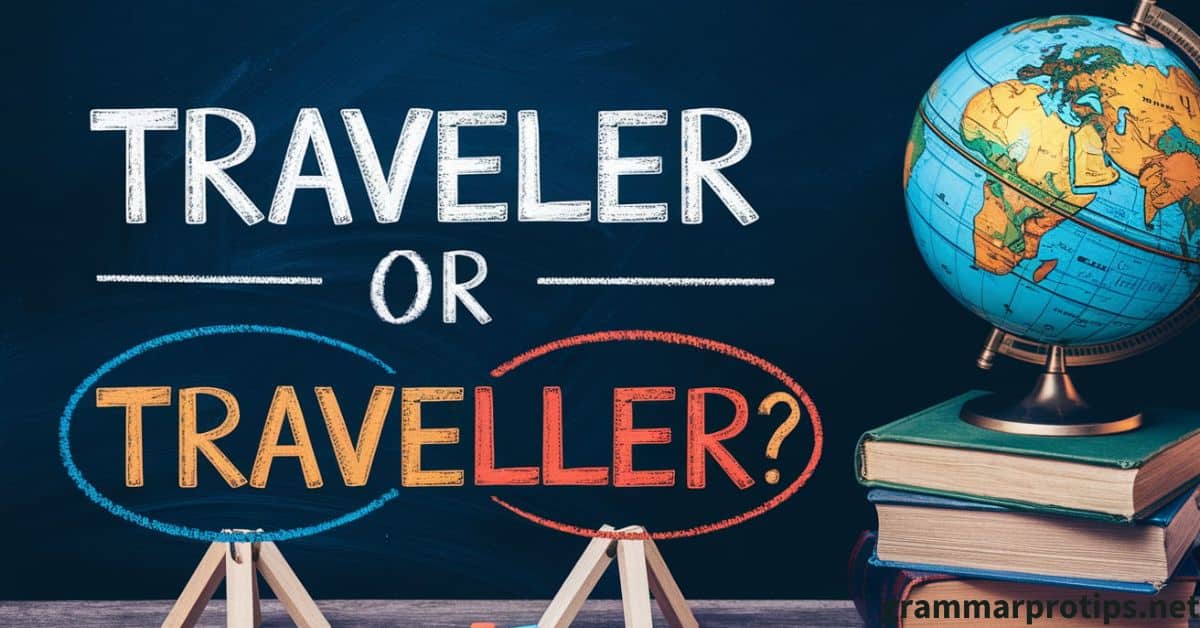When it comes to writing about travelers or travellers, one question consistently arises: Which spelling is the correct one? Is it “traveler” or “traveller”? Well, the answer is not as straightforward as it seems. The choice between these two variations depends largely on the version of English you’re using American English or British English.
In this article, we’ll explore the differences between traveler and traveller, discuss their meanings, and dive into practical examples, such as emails, to help clarify how and when to use each form.
We’ll also explore some interesting side topics like traveller vehicle and travellers insurance, and even touch on how this question fits into popular culture, such as the traveller or traveler in Genshin Impact.
Traveler Spelling in American English
If you’re writing in American English, the preferred spelling is “traveler” with just one “l”. The rule here is that American English tends to simplify many words by dropping one of the double letters found in British English.
This trend applies to many other words, like canceled vs. cancelled and traveled vs. travelled. So, when you’re communicating in the U.S. or writing for an American audience, you’ll almost always use the spelling traveler.
Example Email: Traveler Spelling in American English
Let’s say you’re writing an email to a travel agent in the U.S. Here’s how you might use the American spelling:
Subject: Inquiry About Upcoming Trip
Dear Sarah,
I hope this email finds you well. I wanted to check in about the upcoming trip I have planned to Hawaii next month. I’m curious about your recommendations for the best hotels in the area and what activities are most popular among fellow travelers.
Could you also let me know if there are any specific COVID-related guidelines for travelers arriving in Hawaii?
Looking forward to hearing from you!
Best regards,
John Turner
Notice that in the email, traveler appears with a single “l,” in keeping with American spelling conventions.
Traveler Spelling in British English
In contrast, British English uses “traveller” with two “l”s. This form follows the traditional rules of English spelling, which are typically more conservative than their American counterparts.
Many words in British English retain their original double letters, as you’ll see in terms like cancelled, traveled, and focussed. So, if you’re writing for a British audience, you’ll want to use the traveller spelling.
Example Email: Traveller Spelling in British English
Here’s how the same email might look when written for a travel agent in the UK:
Subject: Inquiry About Upcoming Trip
Dear Sarah,
I hope you’re doing well. I’m writing to inquire about my upcoming trip to Hawaii. I’ve heard that the island offers a range of activities that are popular among travellers. Could you advise on the best options?
Additionally, are there any special guidelines for travellers visiting Hawaii during this time?
Looking forward to hearing from you!
Best regards,
John Turner
In this version, the word traveller is spelled with two “l”s, adhering to British English norms.
Traveler or Traveller Meaning: What’s the Difference?
It might seem like there’s a meaning difference between traveler and traveller, but in truth, they are synonyms. Both words refer to someone who is traveling, whether for leisure, business, or exploration. The only difference lies in the spelling, depending on the form of English you are using.
So, when you ask “traveller or traveler, which is better?”, the answer really depends on where you are or the audience you’re writing for. In terms of meaning, both words are essentially interchangeable.
How Do You Spell Traveler?
The short answer is: it depends on which variety of English you are using. If you’re using American English, the correct spelling is “traveler”, with one “l”. In British English, however, you’ll want to use “traveller” with two “l”s.
You might find yourself asking, “But how do you spell traveler if I’m unsure of the audience?” The best rule of thumb is to know the geographic location of your reader or the publishing guidelines you’re following.
If you’re in the U.S. or working with an American company, stick with traveler. If you’re in the U.K. or writing for a British audience, traveller is your go-to.
How to Spell Traveler: A Simple Guide
| Region | Spelling |
|---|---|
| American English | Traveler |
| British English | Traveller |
This table should make it clear that the main difference between traveller or traveler boils down to where the word is being used.
Traveler Synonym
While traveler and traveller are the most common terms, you can also use synonyms to add variety to your writing. For example:
- Voyager
- Explorer
- Tourist
- Wanderer
- Nomad
These words can help convey the idea of someone who is traveling, but they might carry additional nuances. For example, nomad implies someone who moves frequently without a fixed home, while tourist suggests someone who is visiting a place for leisure.
Traveling or Travelling?

Another common question that often arises alongside traveller or traveler is the spelling of “traveling”. This one follows the same logic:
- Traveling is the preferred spelling in American English.
- Travelling is used in British English.
Here’s an example of each:
- American English: “I’m traveling to France next month.”
- British English: “I’m travelling to France next month.”
It’s all about the “l” if you’re writing for an American audience, drop that second “l” and go with traveling.
Common Scenarios for Traveler vs. Traveller
Scenario 1: Writing a Blog Post
If you’re writing a travel blog for an American audience, you’ll want to use “traveler” in your posts. For example:
“Every year, thousands of travelers flock to the bustling streets of New York City. Whether you’re exploring Times Square or taking in the view from the Empire State Building, there’s no shortage of things to do.”
However, if you’re targeting a British audience, stick with traveller:
“Each year, many travellers make their way to New York, eager to explore the vibrant culture and history that the city has to offer.”
Scenario 2: Writing for a Travel Agency
Let’s say you’re an email marketer for a travel agency in the U.S. Here’s how you might frame your email:
Subject: Special Deals for Travelers
Dear Emily,
We’re excited to offer our travellers a chance to book discounted flights to Europe this summer. Whether you’re planning a solo adventure or a family getaway, we’ve got something for every type of traveler.
Book your tickets soon and don’t miss out on these limited-time offers!
Best regards,
James Miller
Marketing Team
Scenario 3: Casual Conversation in a Game
In popular games like Genshin Impact, the term traveler is used frequently. In this case, the traveler is the main character someone who roams different lands. If you were discussing the game, you might say:
“In Genshin Impact, you play as the Traveler, a character who journeys through various worlds in search of their sibling.”
If the discussion is for a British audience, you might say:
“In Genshin Impact, the character you control is the Traveller, who embarks on a quest to find their lost sibling.”
How to Pronounce Traveller
If you’re unsure how to pronounce traveller, the good news is that it’s the same as traveler. Both are pronounced as /ˈtrævələr/, with the stress on the first syllable. The only real difference is in the spelling.
Traveller Gypsy: A Sensitive Term
Historically, the term traveller has also been used to describe a nomadic group of people often referred to as gypsies although this term is considered outdated and potentially offensive.
Today, traveller communities are recognized in many countries as distinct cultural groups with a long history of mobility and self-sufficiency. It’s important to be mindful and respectful when using the word in any context.
Conclusion: Traveler or Traveller?
Ultimately, the question of traveller or traveler, while simple, reveals the complex nature of language and regional differences. Both spellings are correct it just depends on the version of English you’re using. When writing in American English, opt for traveler, and when writing in British English, go with traveller.
Whether you’re discussing travellers insurance, the traveller vehicle, or even the traveller or traveller meaning in literature or games, understanding the distinction will ensure you’re always using the right form for your audience.
By following these guidelines, you can be sure you’re spelling correctly and communicating effectively, no matter where your audience
is from!
Do you still have questions about traveller or traveler? Or maybe want a deeper dive into traveller synonyms? Feel free to reach out or leave a comment below!

Sienna Mauldon is a passionate writer and grammar expert. On her blog, she shares easy-to-follow guides to help readers master grammar rules and improve their writing. With a love for language and teaching, Sienna makes grammar simple and fun for everyone, from beginners to experienced writers.








